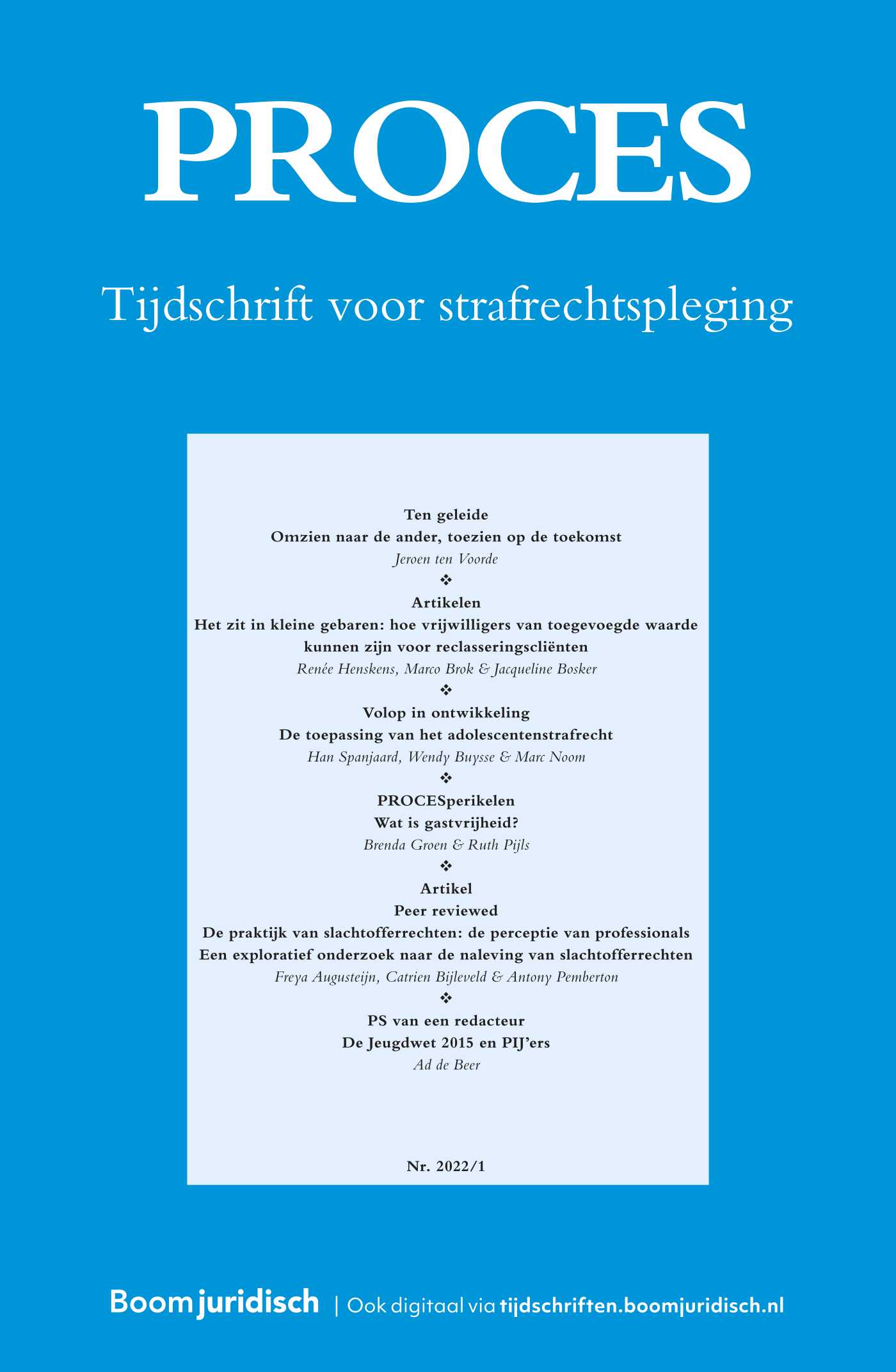|
Cooperation by professionals dealing with cases of stalking by former partners is complex. First and foremost professionals should focus on a shared ambition in order to stop stalking. But in order to achieve that goal partners in safety and security should be in the clear regarding practical matters: how do they consult each other? What appointments are made? How is invested in the development of a mutual relationship and the understanding of each other’s tasks? |


PROCES
Meer op het gebied van Criminologie en veiligheid
Over dit tijdschriftMeld u zich hier aan voor de attendering op dit tijdschrift zodat u direct een mail ontvangt als er een nieuw digitaal nummer is verschenen en u de artikelen online kunt lezen.
| Ten geleide |
Stelselmatig fouten maken |
| Auteurs | Prof. dr. mr. Jeroen ten Voorde |
| Auteursinformatie |
| Artikel |
|
| Trefwoorden | Stalking, Ketensamenwerking, Veiligheidssamenwerking |
| Auteurs | Herman van Alphen, Bert Bambach, Prof. dr. Janine Janssen e.a. |
| SamenvattingAuteursinformatie |
| Artikel |
Het opzettelijk groeimodel van het jeugdstrafrechtHoe jeugdigen de klos zijn van bewust onbekwame politici |
| Trefwoorden | Jeugdzorg, Jeugdbeleid, Jeugdstrafrecht, Onbekwame politici |
| Auteurs | Prof. dr. René Clarijs |
| SamenvattingAuteursinformatie |
|
The Dutch youth policy limits itself to children who have or cause problems. Our Youth Law is even only related to youth care. |
| Artikel |
Informatiegestuurd politiewerk: met reflecties voor de strafrechtsketen |
| Trefwoorden | Informatiegestuurd politiewerk, Kennismanagement, Organisatiefactoren, Strafrechtsketen |
| Auteurs | Flore van Rosmalen MSc, Dr. ir. Annette de Boer, Dr. ir. Mariëlle den Hengst e.a. |
| SamenvattingAuteursinformatie |
|
Intelligence-led policing (ILP) has been adopted by police organisations worldwide, yet organisational implementation appears to be difficult. Results of this study uncover organisational factors that affect ILP and give insight on how these facilitate or hinder ILP. The organisational factors can be categorised into technological, structural, cultural and people related factors. This research was conducted by means of a literature review and two case studies on the investigation of organised drug-related crime and on football and safety in two different units of the Dutch police. The results of this study can be considered as relevant input regarding future implementation of intelligence-led operations in the whole criminal justice chain. |
| Artikel |
Helder communiceren over recidiverisico’s |
| Trefwoorden | risk communication, risk assessment, Recidivism |
| Auteurs | Vivienne de Vogel, Jacqueline Bosker en Ellen van den Broek |
| SamenvattingAuteursinformatie |
|
Structured assessment of the risk of repeated offending has become common practice in the judicial system. However, much less attention has been paid to the way of communicating about the results of these risk assessments to the court or forensic settings. Research shows that the way of communicating about risks of relapse may affect decision-making by judges. In this article, these research results will be summarized and the different approaches to risk communication are discussed. Finally, recommendations are provided for clear communication about risk assessment results. |
| PROCESperikelen |
Contact-Café: een ontmoeting tussen ‘binnen’ en ‘buiten’ |
| Auteurs | Swanny Kremer, Esther Lammers en Jeannette van der Meijde |
| Auteursinformatie |
| PS van een redacteur |
Van ‘swampy problems’ naar weer grond onder de voeten |
| Auteurs | Dr. Jacqueline Bosker |
| Auteursinformatie |

